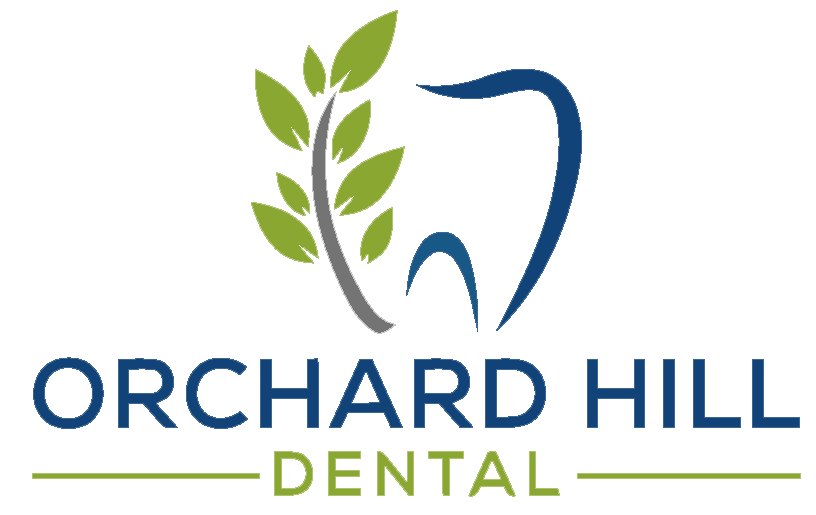Do you have missing teeth? Do you want a fuller and more balanced smile? At Orchard Hill Dental we offer restorative options for missing teeth that can improve the form and function of teeth. Patients can receive comfortable and high-quality treatment in our Hendersonville, NC office.
If you want to schedule an appointment with Dr. Jessica Christy, you can call (828) 247-7001 or request a consultation online.

Restorative Treatment Options for Missing Teeth at Orchard Hill Dental
Before choosing treatment, your dentist in Hendersonville, NC will assess your oral health, taking your budget, and personal dental goals into consideration. Depending on how many missing teeth you have, as well as how much remaining tooth structure is left, she will choose one of these solutions:
Dental Implants: Single missing teeth or whole arches of teeth can be replaced utilizing dental implants. Dental implants consist of a titanium post which is inserted into the jawbone. After a period of 3 to 6 months, a permanent abutment and dental crown are added for a permanent restoration.
Dental Bridges: One or more teeth can be replaced with dental bridges. This option can be removable or secured in place with dental implants. Dental bridges can also utilize surrounding natural teeth to secure and replace consecutive missing teeth. Further tooth loss can be prevented with this solution.
Dentures and Partials: Multiple teeth or the upper and lower arches of teeth can be replaced with dentures or partial dentures. Like dental bridges, dentures can be removable or secured by dental implants. Many patients also find that it is easier to bite and chew food with these dental restorations.
Why Should You Replace Missing Teeth?
Replacing missing teeth helps to support long-term oral health and improves the appearance of your smile. Without the root structure of the missing tooth, the stability of the entire smile becomes compromised. Teeth are more likely to shift, gums are susceptible to infection, and over time the jaw bone begins to deteriorate.
Whether you are missing one tooth or a full set of teeth, replacing your missing teeth is imperative to help support the long-term function of the bite and oral health.
Missing teeth can increase the risk of:
- Additional tooth loss
- Gum disease
- Speech issues
- Bone loss
- Facial sagging
- Gum recession
- Shifting teeth
Missing Teeth FAQs
Missing teeth impact the health of your entire mouth. Read the answers to these frequently asked questions to learn more.
What are my options if I have missing teeth?
Patients with missing teeth have many options for replacement. Dental implants are the most common because they are very reliable and look and feel like natural teeth. They are also a great option because they can be used to replace single teeth or multiple teeth in different areas.
What happens when you lose a tooth?
When a tooth is lost, the surrounding bone structure may shrink over time due to lack of stimulation. This can lead to changes in your facial appearance, including sagging or sunken cheeks. The remaining teeth may shift or become misaligned to fill the gap left by the missing tooth, potentially causing problems with your bite and oral function.
Can missing teeth affect your speech?
Yes, missing teeth can affect speech, especially if they are in the front of your mouth. Teeth play an important role in forming certain sounds; a gap can alter your ability to pronounce words correctly. This can lead to a lisp or other speech issues, making communication more challenging.
Can missing teeth cause bone loss?
Yes, missing teeth can lead to bone loss in the jaw over time. When a tooth is missing, the bone in that area no longer receives the stimulation it needs from chewing, which can cause the bone to shrink or deteriorate. This is one reason why dental implants are recommended, as they help maintain bone structure by mimicking natural tooth roots.
Can I still eat normally with missing teeth?
While eating with missing teeth is possible, it can be challenging. Chewing may become uncomfortable or inefficient depending on where the tooth is missing. Some people may avoid foods that are harder to chew, such as raw vegetables or tough meats. Replacing missing teeth with dental implants, bridges, or dentures can restore normal chewing function.
How can I prevent tooth loss?
Preventing tooth loss involves maintaining good oral hygiene, which includes brushing and flossing regularly and visiting the dentist for routine check-ups and cleanings. Avoiding habits that can damage teeth, such as smoking or grinding, can also help prevent tooth loss. Additionally, addressing any dental problems, such as cavities or gum disease, early can reduce the risk of losing teeth.
